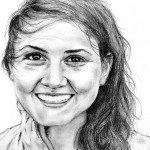When I got glasses at age three, I apparently raved about “all the colors.” With them, I could see noses and eyes, instead of just faces; leaves and branches, instead of just trees. The colors and details were new. Over the course of the past 19 years, though, I’ve gotten used to these sights, and I’m scared I have stopped seeing them at all. These days, I am trying to go back to the wonder I felt when my landscape looked new. I hunger for better vision. I squint and stare. I chase sight.
 Really seeing isn’t easy. Lately, I’ve turned to some old transcendentalists for tips. They chased sight for years. Ralph Waldo Emerson claims to have become “a transparent eyeball” who became nothing and saw all; Henry David Thoreau waded through muck and apparently spent a day staring at a bullfrog in Walden Pond; John Muir once climbed to the top of a 100-foot tall Douglas fir during a storm in the Sierras to feel the wild sway of its branches and take in the view.
Really seeing isn’t easy. Lately, I’ve turned to some old transcendentalists for tips. They chased sight for years. Ralph Waldo Emerson claims to have become “a transparent eyeball” who became nothing and saw all; Henry David Thoreau waded through muck and apparently spent a day staring at a bullfrog in Walden Pond; John Muir once climbed to the top of a 100-foot tall Douglas fir during a storm in the Sierras to feel the wild sway of its branches and take in the view.
I want to see what they saw. I’ve puzzled, though, with little success, over how to become a transparent eyeball. I haven’t been able to sit still for minutes, let alone hours, let alone a full day. I’ve also never climbed a 100-foot tree.
Annie Dillard tries to see better by reading about how the newly sighted described the world: shadows as dark marks, landscapes as color patches. When Dillard tries to see like the formerly blind, though, she writes that she can’t “unpeach the peaches.” She can’t see with as little meaning and as much wonder. She can’t see the world as new. Finally, after a summer of chasing sight, she sees a vision one little girl described in a garden: “the tree with the lights in it.”
Again, I am jealous. I want to see with less meaning and more wonder — anything to remind me of how new all I’m seeing is. I go after some new sights I’ve heard about — reindeer lichen on rocks and trees, that owl on Old Campus. It’s too hard to see what I am not looking for, especially when what I’m seeing looks familiar. This weekend, someone tried to tell me you couldn’t see the moon from New Haven.
While all this chasing helps, I know I’m still missing a lot. It worries me.
Camping as a kid, I would often forget my glasses. I would keep my contacts in as late as I could bear, staring at the sky from my sleeping bag with all the vision I could muster as my tired eyes dried and itched. The alternative without contacts was worse. Fuzzy-eyed, I would strain my sight while other campers gushed and pointed, agonizing about which wish to use on the streaks of light apparently gliding across what looked to me like a blank, black canvas.
I’m afraid I’m walking around this city and seeing a blank, black canvas. What line of silver light might be gliding by unnoticed? What bright moon might be clouded by my socked-in sight? Thoreau writes, “Heaven is under our feet as well as over our heads.” If I crawl through the grass, muddying my knees and sniffing the earth, can I see what I’ve missed, maybe some heaven in New Haven?
Seeing better is loving better. Whenever I’ve looked a little closer at this place, I’ve fallen hard for it.
Too often, though, I don’t keep looking closer. As soon as I’m used to a sight, I trick myself into thinking I’ve seen it and I’ve known it and I’m done. Images freeze in my mind, no longer refreshing every time I blink.
But here’s a secret we already know: nothing is static. Nothing and no one I’ve ever seen is still the same. The chase doesn’t end. If we want to see this place — really see it, maybe fall for it — we have to keep opening our eyes. We have to keep seeing colors as new. We have to keep paying attention.
The other night I ran to East Rock. It was misty and dark. Running down Orange Street with an empty mind, I finally saw it: the tree with the lights in it. I stopped, stunned. The burrs at the outer tips of the tree’s branches were encased in globes of shine. Rusty light from a nearby lamp hit each, filling the spheres with brightness. When I finally took a step toward the tree, the glow was gone. But I skipped and danced down the next block, howling at a moon I couldn’t see, tasting the sweet air of light rain. I could, for a brief moment, believe my eyes.
Diana Saverin is a senior in Berkeley College. Contact her at diana.saverin@yale.edu .







